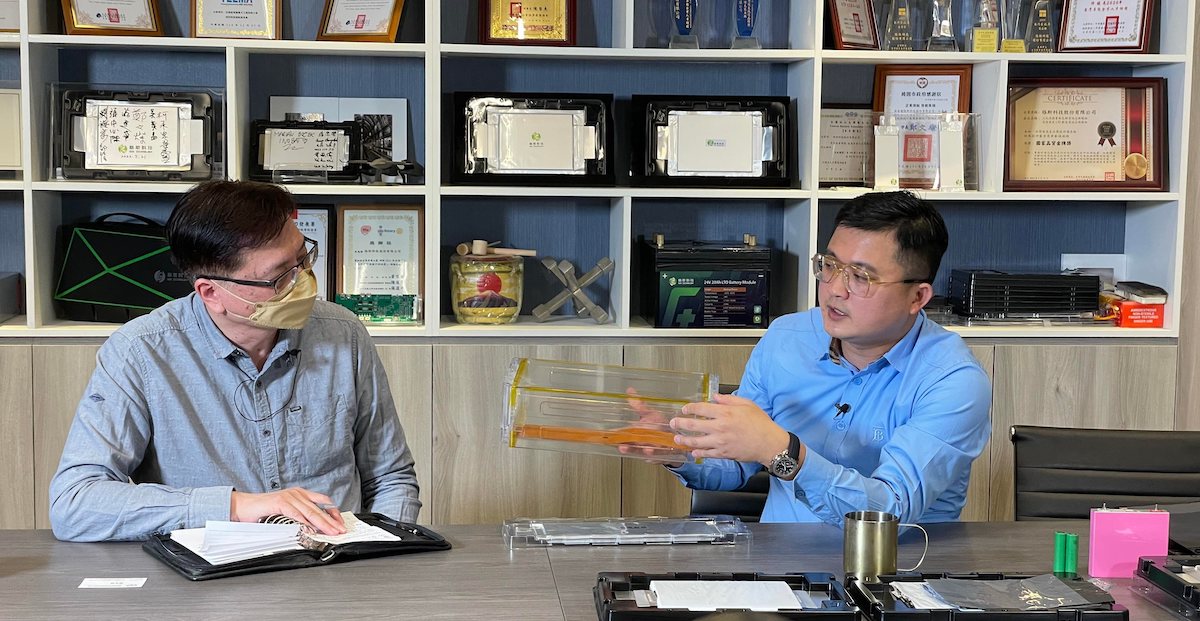As the global power battery industry blossoms, China, Korea, and Japan, the top three industry giants, reign over a combined 90% of lithium battery capacity installed. Before the development of next-gen batteries in at least five years, lithium batteries will remain mainstream in the power battery industry. Currently, many Taiwanese companies are readying themselves to branch out to this market (such as TCC, FPC, and Foxconn), with many start-ups focusing on battery R&D to blaze their trails in this immense business opportunity. On the afternoon of 26 December, the Auto Future editorial team came to GUS Technology in Xizhi, New Taipei to conduct a multifaceted interview of the domestic tech-based battery startup with Chairman Dr. Chang.
 Dr. Chang (Right), the Chairman of GUS Technology, had an interview with Jeff Lee (Left), the editor of Auto Future.
Dr. Chang (Right), the Chairman of GUS Technology, had an interview with Jeff Lee (Left), the editor of Auto Future.
Less than eight years after its foundation, GUS Technology decided to change focus to battery cell R&D five years ago. Till now, the company’s pouch cell manufacturing technology has set itself apart from the industry and achieved breakthrough advancements in various lithium battery techs.
- Lithium-titanate battery, LTO:
LTO excels in rapid charging and discharging, high safety standards, and long life spans but underperforms in its energy density. LTO was often used in electric buses to match their short-range business needs. After tech collaborations with several Japanese companies, GUS honed in their product quality control and adjusted its LTO electrode material, drastically raising the battery’s energy density from 60~80Wh/kg to 150, matching that of lithium iron phosphate, LFP, batteries. Combined with GUS’s intricate manufacturing line, the product now possesses high market competitiveness. Fresh out of its R&D cycle, Gus’s LTO costs are higher than average, with partnerships consisting of ships, the military, and mild hybrid passenger vehicles. After the Zhongli factory’s completion next year, boosting the company’s production expansion, LTO’s costs can further decrease to cover more applications.
- NCM811 high-nickel ternary lithium battery: as the LTO improvement process mentioned above, Chang’s focus on technics further raised NCM811’s energy density. GUS collaborated with a Slovakian battery R&D company, InoBat Auto, to increase the ternary lithium battery’s energy density by adjusting battery materials from the usual 250 Wh/kg to a startling 340! As Chang revealed, this high-energy-density battery cell will go into mass production in the latter half of next year at the company’s Zhongli factory, supplying InoBat Autouto with millions of battery cells annually.
Compared with other Taiwanese start-ups, GUS focuses on increasing the performance of battery cells and emphasizes production technicalities, combining theory and mass production to fulfill clients’ various needs. As 2023 draws near, the company’s objective will also realize. After the Zhongli factory’s completion, Gus will focus on autonomous guided vehicle (AGV) batteries and energy storage products in the first half of 2023 and introduce power battery cell manufacturing in the latter half. Current plans for the factory annual production capacity sit at 1GWh, while later expansions will increase in units of 2GWh according to demands. With such technical prowess, Gus will walk its unique path in the realm of power batteries and energy storage devices.